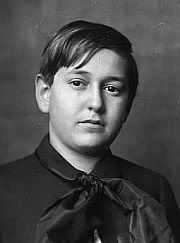Erich Korngold, age 12
Erich Korngold is not as famous as Wolfgang Amadeus Mozart, but he left his imprint on the musical world, and it is possible that had it not been for difficult circumstances -- mainly, having to escape to America from Austria as the Nazi madness loomed over Europe -- his accomplishments would have rivaled those of Mozart.
He is probably best known today among old-movie buffs, having written the scores for many popular films of the '30s and early '40s (The Sea Hawk, Elizabeth and Essex, The Adventures of Robin Hood, Kings Row, etc.). But his career began as a classical composer, and he continued in that vein after retirement from Hollywood.
The very young Korngold demonstrated musical abilities that astounded everyone around him. As the Korngold Society says in its potted biography (and the facts are corroborated elsewhere):
Already having played the piano from a very early age, the young prodigy composed his first original works in 1905 at the age of eight. Demonstrating a phenomenal musical precocity towards music, Korngold was taken by his father in 1906 to meet and play for Gustav Mahler. Proclaiming the child a genius, Mahler encouraged the elder Korngold to engage the renowned composer Alexander von Zemlinsky as the boy's mentor. Though there were lessons with Robert Fuchs and Hermann Grädener among others, for all intents and purposes Zemlinsky would be Korngold's only teacher, and for only a short time at that.
Julius Korngold published privately three of his son's compositions in 1909 - the ballet "Der Schneemann" (The Snowman), the Piano Sonata #1 in d minor, and the character study suite "Don Quixote" - and distributed them to dozens of musical authorities, inlcuding Artur Nikisch, Englebert Humperdinck, Hermann Kretzschmarr, and Richard Strauss among them. All who examined the scores expressed amazement at their originality. Strauss in particular singled out their bold harmonies and assurance of style.
Of all his early accomplishments, perhaps winning the admiration of the self-absorbed Gustav Mahler best testifies to his brilliance.
Not long after, the two-act ballet/pantomime Der Schneemann introduced the young wunderkind to the world with two premiere productions in 1910. The first, a performance in April at the ministerial palace of Baroness von Bienerth, employed a four-hand piano arrangement with the young composer at one piano, and Richard Pahlen at the other. The second, in October, presented an orchestral arrangement of the ballet premiered by imperial decree at the Vienna Hofoper on Emperor Franz Josef's name-day. The sensation was followed in November by the Munich and New York premieres of his Piano Trio, Op. 1. Astounded by the abilities of this "miracle child", the musical cognoscenti of the time were quick to take up and promote the creations of this musical wunderkind.
In 1911, Artur Schnabel premiered (and afterward championed extensively) the Piano Sonata #2 in E Major, Op. 2. The same year also saw Artur Nikisch give the world-premiere at the Leipzig Gewandhaus of Korngold's first orchestral work, the Schauspiel Ouvertüre, Op. 4, displaying the composer's gift for orchestration. In 1913, the Sinfonietta in B Major, Op. 5 - a symphony all but in name - was premiered in Vienna under the baton of Felix von Weingartner, and the Violin Sonata in G Major, Op. 6 was premiered by Karl Flesch and Artur Schnabel in Berlin, fully demonstrating the composer's range of mastery from the large late-Romantic orchestra to the virtuosic intimacy of smaller-scored chamber works.
Schnabel is renowned as one of the 20th century's greatest pianists; Nikisch and Weingartner were conductors as celebrated in their time as Bernstein and Karajan were later.
Like Mozart, Korngold seemed to be born with a musical soul that no child could have acquired through ordinary development, that could not be explained by talent or even genius.
The Manchester Guardian of December 12, 1912 carried an account of a visit to the home of the young Korngold by a writer called W.P. Price-Heywood. Although actually a transcript of an account by a woman who wanted to remain anonymous, Price-Heywood maintained that "although 'written up' a little, the article is a record of fact, and may be taken literally." The Guardian article, along with a statement by the writer, was published in the Journal of the Society for Psychical Research in its April 1913 issue.
The eyewitness to the behavior of Korngold at the age of about 15 wrote:
It is clear from watching Korngold that musical ideas flow through his mind far quicker than he can record them. The brain always lags behind the elusive thought. Much that he writes is too difficult for him to play; indeed it would obviously be impossible for him to be capable of playing the intricate and infinitely varied orchestral work which he has written since he was eleven years old.
How did he get this knowledge? His musical education was received from an average Viennese music-master. His father, although he has a deep theoretical and a fine critical knowledge, plays but little and cannot compose. Eric's grandparents are ordinary bourgeois folk. No creative musical talent has been known in the family.
For an explanation one is almost forced to fall back o n the hypothesis of reincarnation. Is it possible that this boy genius came into the world fully equipped as a first-class musician, and all that he had to do before starting upon his new career was to run rapidly over the old lessons and regain what he had temporarily forgotten? This is the Platonic idea that all knowledge is reminiscence. In Germany people are actually asking, "Has Eric Wolfgang Korngold lived before as Wolfgang Amadeus Mozart?"
Heywood-Price, in reply to a query from the Society for Psychical Research, fills in more of the background (attested by other sources):
[Korngold] began to show signs of musical genius when he was three years old. In his fifth year this became so pronounced that he was called "the little Mozart." He first composed when he was four. From the age of six he composed regularly and industriously. ... When he was fourteen he wrote his first orchestral work -- the overture to "A Winter's Tale" -- after studying orchestration for only four months. [Emphasis in the original.]
I have heard this work, and was simply astounded at the technical grasp and marvellous facility of the orchestration. The full score was written out at once, without any sketch-plan, and the conductor Nikisch, at the first rehearsal, was particularly amazed by the certainty and vigour of the scoring.
It is said (how accurately I don't know, and perhaps no one knows) that Mozart "heard" entire compositions in his mind before he set them down on paper.
Mr. Ernest Newman, the musical critic, has written of this: "It is evident that the gift for scoring, like that for harmonic combination and modulation, is inborn in him."
Ernest Newman is still remembered and his musical writing reprinted. While some people, perhaps even Heywood-Price, might have exaggerated Korngold's abilities, it is unlikely that a case-hardened musical critic (or Mahler, Strauss, or Nikisch) would have done.
Heywood-Price adds:
What impresses one in K.'s music is its maturity; it has the passion, the yearning, the sadness, the serious thought, of the man who has seen life in many phases. K. has not attended more than ten orchestral concerts in his life; certainly he has not filched his musical ideas from other moderns; as I have said, he will not listen to other people's music. To my mind this phenomenon can only be accounted for by (1) Myers's theory of genius as a subliminal uprush, or (2) the hypothesis of reincarnation.
Myers is Frederic Myers, one of the Society's founders and the author of the famous book Human Personality and Its Survival of Bodily Death, which has been continuously in print since its publication in 1903.
Myers described his idea of the subliminal mind:
The word subliminal . . . has already been used to define those sensations which are too feeble to be individually recognized. I proposed to extend the meaning of the term, so as to make it cover all that takes place beneath the ordinary threshold, or say, if preferred, outside the ordinary margin of consciousness; — not only those faint stimulations whose very faintness keeps them submerged, but much else which psychology as yet scarcely recognises; sensations, thoughts, emotions, which may be strong, definite, and independent, but which, by the original constitution of our being, seldom emerge into that supraliminal current of consciousness which we habitually identify with ourselves. [From Human Personality ... ]
In plainer language, the unconscious and what is sometimes called the super-conscious.
While Korngold's dazzling precocious abilities doubtless emerged from some unconscious mental level, I do not think this explains how a youngster could demonstrate attributes and -- even more significant -- emotions that were simply beyond his years. They may have been "stored" subliminally, but what was their original source? A previous life as a great musician is one possibility, as it may have been for Mozart himself.
But I don't think Heywood-Price's two alternatives are the only ones. The evidence from mediumship suggests that discarnate spirits on the Other Side often influence the living, for good or ill, and that such influence can vary in degree from simply implanting artistic or scientific ideas to temporarily "taking over" the minds of the living. For instance, the spirit of a person who was a creative musician while embodied might want to use an earthly mind that is relatively unformed, yet possessing musical tendencies. Young Korngold probably would have been primed by association with his father, or through genetic inheritance of basic musical leanings.
Far-fetched? Maybe, but is it any stranger than the established facts of Erich Korngold's uncanny early life?







6 comments:
I have read that there are those who consider Beethoven a reincarnation of Bach. One of the more interesting and convincing accounts of a historical figure being reincarnated is that of Anne Frank, who may well have been reincarnated as Swedish author Barbro Karlen.
Green Mamba,
I don't believe reincarnation is the most likely explanation for early or outstanding creativity in the arts. There's a lot more evidence from mediumship for spirits contributing to -- or messing with -- living people than there is for reincarnation.
Not saying reincarnation doesn't happen, just that it probably doesn't generate a Beethoven or Mozart. If Beethoven was a newly reissued Bach, was Bach a retread of Monteverdi? And was Monteverdi a new incarnation of Guillaume Dufay, and if so, who was GD before that lifetime? So you get into a kind of infinite regression.
Fascinating. I am currently reading a book about reincarnation and I am currently studying music theory, so this post really speaks to me.
I think it's plausible that people develop talents over a series of incarnations. At some point in their soul's trajectory, having achieved fruition in one area (music, for example), they may choose to focus on other pursuits. The German esoteric writer Thorwald Dethlefsen goes into this in his book "Schicksal als Chance" (I can't seem to find an English translation, which is surprising and disappointing).
Here's a quote from Henry Ford on the subject: "Genius is experience. Some think to seem that it is a gift or talent, but it is the fruit of long experience in many lives""
Stogie,
What book?
Green Mamba,
I think it's plausible that people develop talents over a series of incarnations. At some point in their soul's trajectory, having achieved fruition in one area (music, for example), they may choose to focus on other pursuits.
I think that is plausible, and many writers influenced by the Vedantic tradition would agree. Still, it is too much of a leap to assume that any extraordinary talent is the result of reincarnation. Influence by discarnates on the astral plane seems more likely in most cases.
The Ford Motor Company used to have an advertising slogan: "There's a Ford in your future." Maybe Henry Ford had a Ford in his past.
Question: Was Mozart reincarnated as Erich Korngold?
Answer: Yes.
More interesting question: Who was Mozart a reincarnation of?
Answer: Michealangelo.
Talented entities are not limited to manifesting talent in the same sphere of endeavor when they reincarnate. When they do, as Mozart/Korngold did, they are working through unresolved karmic issues they carried over.
Sometimes, people relive parts of their past lives, e.g. if you died young last time, you relive a similar pattern up to the age you were when you died last time, then get to live the current life from that point on.
By the way, Herr M says 'Hello everyone'. It seems his opposition to being depicted as a frothy boob in the bio-pic is largely technical. Structurally, dramatically, and narratively, I'm informed that there are far better ways to structure a biography of someone with prolific ability than as a naif, and as third part narrative flashback. 'Good Will Hunting' is structurally superior to 'Amadeus'.
Remember, Mozart wasn't just a composer. Writing operas require you write libretti, and understand narrative structure as well (and this from the writer of 'Zauberflotte').
Post a Comment